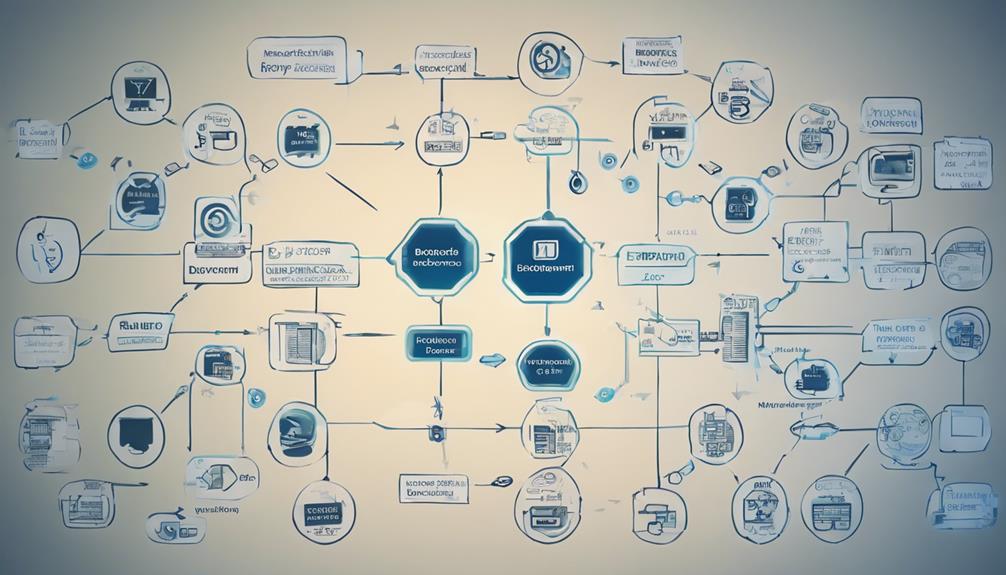Software Development in Riyadh
Definition and Types

Software development is a multifaceted process that entails the designing, creation, and maintenance of computer programs and applications tailored to specific requirements. Within this broad field, various types of software serve distinct purposes. System software, for instance, manages hardware and provides essential functionalities to support the operation of a computer system. On the other hand, application software is crafted for end-users to perform specific tasks or functions, such as word processing or graphic design.Additionally, programming software plays a significant role in assisting developers in writing, testing, and debugging code efficiently. This type of software provides tools and environments conducive to the creation of high-quality applications. Embedded software represents another category, involving specialized programs built into hardware devices to enable specific functionalities. Often found in devices like smartphones, household appliances, and automotive systems, embedded software enhances the performance and capabilities of these devices.Understanding the different types of software is fundamental to appreciating the diverse aspects of software development and its applications in various technological domains.
Jobs That Use Software Development in Riyadh
In today's technology-driven world, professionals in various industries rely on software development expertise to innovate and enhance their operations. Software developers play a critical role in creating, maintaining, and troubleshooting software applications across different sectors.System administrators are responsible for managing and maintaining operating systems and utility programs that are essential for system functionality. Software engineers utilize engineering principles and practices to design and develop software systems that meet specific requirements.Application software developers focus on designing, testing, and maintaining software tailored to business needs and user requirements. Additionally, programming software jobs involve writing, implementing, and testing code for various software applications and systems.These roles demonstrate the diverse applications of software development skills in the modern workforce, highlighting the importance of professionals well-versed in software development across multiple industries.Software Development Methodologies

Utilizing various frameworks and approaches, software development methodologies guide the systematic and efficient creation of software products. Popular methodologies include Agile, Waterfall, Scrum, and DevOps.Agile methodology prioritizes iterative development, customer collaboration, and adaptability to change. It focuses on delivering functional software in short cycles, incorporating feedback to enhance the final product continuously.Waterfall methodology, on the other hand, follows a sequential, linear approach. It progresses through defined phases such as requirements gathering, design, development, testing, and deployment in a structured manner. Each phase must be completed before the next one begins, emphasizing thorough planning upfront.Scrum, an Agile framework, emphasizes teamwork, accountability, and iterative progress in short sprints. It involves cross-functional teams working collaboratively to deliver increments of the product at the end of each sprint.DevOps combines development and operations to streamline collaboration, automate processes, and enhance efficiency throughout the software development lifecycle. By integrating these functions, DevOps aims to shorten development cycles and deliver high-quality software rapidly.
Key Steps in the Software Development Process
Initiating a software development project involves identifying the essential steps that form the foundation for a successful development process. These steps typically include need identification, requirement analysis, software design, coding, and testing and deployment.Need identification is a collaborative process with clients to thoroughly understand their software requirements. Requirement analysis is the initial step where requirements are carefully examined and documented to serve as a guide throughout the project.Software design plays an important role in creating a blueprint based on the analyzed requirements before the actual coding phase begins. Testing and deployment are important in ensuring that the developed software not only meets the specified requirements but also functions correctly before it is released to end-users.Why Is Software Development Important?

Certainly, software development stands as a cornerstone of modern technological advancements, driving innovation and revolutionizing industries worldwide. The importance of software development lies in its ability to create efficient, reliable, and user-friendly applications that cater to the ever-growing demands of the digital era. By enhancing productivity, fostering innovation, and boosting competitiveness across various sectors, software development plays a vital role in shaping modern products, services, and business operations.Moreover, the continuous evolution of software development processes is instrumental in propelling technological advancements and facilitating digital transformation on a global scale. Effective software development practices guarantee the delivery of high-quality, secure, and scalable solutions tailored to diverse needs, thereby enabling organizations to adapt to changing market dynamics and stay ahead of the competition.Fundamentally, software development is not just a technical process but a strategic enabler that drives progress and propels businesses towards success in the digital age.
Key Features of Effective Software Development in Riyadh
An essential aspect of effective software development lies in implementing agile methodologies to foster iterative progress and enhance adaptability in the development process. Agile methodology promotes continuous collaboration between cross-functional teams, allowing for faster value delivery and the ability to respond to changing requirements efficiently. DevOps practices further enhance this collaboration by integrating development and IT operations teams, leading to improved communication and automation throughout the software development lifecycle. Continuous Integration/Continuous Deployment (CI/CD) plays a critical role in automating code integration, testing, and deployment processes, ensuring that changes are implemented swiftly and reliably.Additionally, the adoption of a microservices architecture enables the development of decentralized, independently deployable services. This approach enhances scalability and flexibility, as each service can be developed, deployed, and scaled independently, without affecting the entire system. Effective software development empowers teams to be responsive to change while maintaining a high level of quality and efficiency, ultimately leading to successful and innovative software solutions.Waterfall Versus Iterative Development Misconceptions

Contrary to popular belief, misconceptions surrounding the comparison between Waterfall and Iterative development methodologies persist in the software development industry. Waterfall development follows a linear, sequential approach with distinct phases such as requirements gathering, design, implementation, testing, and deployment. In contrast, Iterative development involves repetitive cycles of development, allowing for feedback and adjustments throughout the process.One common misconception is that Waterfall is too rigid and lacks flexibility, while Iterative development is often perceived as chaotic and lacking structure. In reality, Waterfall is best suited for projects with well-defined requirements upfront, while Iterative development shines in projects with evolving or unclear requirements. Waterfall may lead to delayed feedback and potential rework due to its linear nature, whereas Iterative development promotes continuous improvement and collaboration.Understanding the strengths and weaknesses of each methodology can help teams choose the most suitable approach for their specific project needs, dispelling these misconceptions in the process.
Waterfall or Agile? Differences Between Predictive and Adaptive Software Methodologies
In software development, the choice between Waterfall and Agile methodologies hinges on the fundamental disparity between predictive and adaptive approaches. Waterfall follows a sequential process with distinct phases such as requirements gathering, design, implementation, testing, and maintenance. In contrast, Agile methodology emphasizes flexibility by breaking down projects into smaller, manageable iterations known as sprints. Waterfall is considered predictive as it requires thorough upfront planning based on fixed requirements, while Agile is adaptive, allowing for changes throughout the development cycle based on feedback received during regular collaboration with stakeholders.Waterfall is typically favored for projects with clearly defined and stable requirements, where a rigid plan can be followed effectively. On the other hand, Agile is more suitable for dynamic projects where requirements are expected to evolve over time. Agile's iterative nature and focus on customer involvement make it well-suited for environments that demand flexibility and quick adaptation to changing needs.Jobs That Use Software Development

Professionals in various industries rely on individuals skilled in software development to create, maintain, and troubleshoot essential software applications. System administrators play a critical role in managing operating systems and utility programs to guarantee the smooth operation of software.Software engineers, on the other hand, apply engineering principles to design and develop complex software systems that meet specific requirements. Application software developers focus on creating user-friendly software tailored to meet the unique needs of businesses, enhancing productivity and efficiency.Additionally, programming software jobs encompass a wide range of roles, from entry-level positions involving basic coding tasks to advanced positions requiring in-depth software development expertise. These professionals work across sectors such as healthcare, finance, education, and more, demonstrating the versatility and importance of software development skills in today's technology-driven world.Whether developing mobile applications, designing web platforms, or optimizing existing software, software developers are integral to the success of modern businesses.
System Software in Riyadh
Software development professionals proficient in creating user-friendly applications for various industries rely heavily on system software, which serves as the foundation for executing application software and managing hardware components. System software is specifically designed to provide a platform for running application software and controlling hardware components within a computer system. This category of software includes well-known operating systems such as Windows, macOS, and Linux, along with utility programs that aid in managing computer resources efficiently.One of the primary functions of system software is to manage computer hardware, memory, file systems, and other essential operations important for overall system performance. By handling these critical tasks, system software plays a pivotal role in ensuring the smooth functioning and interaction of various software and hardware components. Without the presence of system software, computers and devices would be unable to perform essential tasks or run application software effectively. Therefore, software developers must have a solid understanding of system software to create robust and reliable applications that can operate seamlessly within the computing environment.Programming Software in Riyadh

Programming tools such as integrated development environments (IDEs) are vital for software developers to efficiently write, edit, and compile code for creating various digital solutions. These tools offer features like syntax highlighting, code completion, and debugging capabilities to streamline the coding process and help developers write efficient code.Popular programming software options include Visual Studio, Eclipse, IntelliJ IDEA, and Sublime Text, catering to different programming languages and providing a range of functionalities. Programmers utilize programming software to develop software applications, websites, mobile apps, and other digital solutions, making it a cornerstone in the software development process.Mastering the use of programming software is essential for individuals aspiring to excel in the software development industry, as it enhances productivity, code quality, and overall efficiency in creating innovative digital products.
Application Software in Riyadh
When considering the domain of digital tools utilized in software development, a pivotal focus shifts towards Application Software, specifically tailored to address distinct tasks or functions within various industries and domains.Application software is designed with specific purposes in mind, such as word processing, email management, or graphic design. It is created to meet the needs of end users and is often customizable to suit individual preferences, enhancing user experience and productivity. Examples of widely used application software include Microsoft Office for office productivity tasks, Adobe Photoshop for graphic design, and Google Chrome for web browsing.One of the key features of application software is its graphical user interface (GUI), which provides an interactive and user-friendly experience for individuals. Setting it apart from system software, application software is intended for end users to accomplish specific tasks or goals efficiently and effectively.Programmers or Coders

Programmers, also known as coders, are fundamental contributors to the creation and development of software applications. They are skilled professionals responsible for writing and modifying code to bring software designs to life. Working closely with software developers and engineers, programmers play a vital role in translating design requirements into functional code that powers various software solutions. Using programming languages like Python, Java, C++, and JavaScript, programmers focus on the technical implementation of software features and functionalities, making sure that they align with project specifications.Their expertise lies in turning algorithms and logic into working programs, which are essential components of the software development process. By meticulously coding and testing software, programmers make sure that applications are robust, efficient, and user-friendly. Their ability to understand complex algorithms and problem-solving skills enables them to create innovative solutions that meet the needs of users and businesses alike.
Software Engineers in Riyadh
Software engineers are instrumental in designing, developing, and maintaining software systems tailored to specific user requirements, utilizing programming languages such as Java, Python, and C++ alongside specialized tools like IDEs. They play an important role in the software development process by working closely with clients, stakeholders, and team members to make sure that projects meet their objectives.Software engineers are responsible for analyzing user needs, troubleshooting technical issues, and implementing efficient solutions throughout the software development lifecycle. Their expertise is essential from the initial design phase to deployment and ongoing maintenance of software applications. By leveraging their programming skills and utilizing various tools, software engineers contribute to the creation of functional and user-friendly software solutions.Their ability to adapt to evolving technologies and their problem-solving skills make them essential members of any software development team.Frequently Asked Questions
What Does a Software Developer Do?
In their role, professionals analyze requirements, design solutions, implement strategies, and maintain systems to meet objectives. Collaboration with stakeholders, adherence to best practices, and continuous skill development are vital for delivering effective solutions in a dynamic environment.What Do You Mean by Software Development?
Software development refers to the systematic process of creating, testing, and maintaining computer programs and applications to meet specific requirements. It involves stages like analysis, design, implementation, testing, deployment, and ongoing support to guarantee functionality and performance.How Difficult Is Software Development?
Solving the challenges of mastering a complex skill like software development requires problem-solving prowess, attention to detail, and a commitment to continuous learning. The difficulty level can vary based on project scope, requirements, technology stack, and team dynamics.What Are the 5 Steps of Software Development?
The 5 steps of a structured development process typically include requirement analysis, design, implementation, testing, and deployment. Requirement analysis involves understanding project needs, design focuses on architecture, implementation translates design into code, testing identifies errors, and deployment launches the software.Riyadh Software Development: Driving Innovation and Growth
Riyadh, the capital city of Saudi Arabia, has emerged as a leading hub for software development in the Middle East. With its rapidly growing technology sector and strong government support, Riyadh has become an attractive destination for companies looking to tap into a pool of skilled developers and engineers.
The Rise of Riyadh as a Software Development Hub
In recent years, Riyadh has seen significant investment in its technology infrastructure and educational programs. The government has actively supported the growth of the software development industry by offering incentives to local and international companies, as well as by investing in educational initiatives to develop a skilled workforce.
Riyadh Software Development has quickly gained a reputation for its innovative solutions and high-quality products. The city’s software development companies have been at the forefront of developing cutting-edge technologies, such as artificial intelligence, blockchain, and Internet of Things (IoT) applications.
Opportunities for Collaboration and Growth
For businesses looking to outsource software development, Riyadh offers a wealth of opportunities for collaboration. The city’s companies are known for their strong work ethic, attention to detail, and commitment to excellence. Additionally, the competitive pricing and access to a diverse talent pool make Riyadh an ideal destination for companies seeking to develop custom software solutions.
Conclusion
In conclusion, Riyadh has firmly established itself as a leading destination for software development in the Middle East. With its supportive government policies, skilled workforce, and commitment to innovation, the city is poised for continued growth and success in the software development industry. Whether you are a business looking to outsource your software development needs or an individual seeking to join a dynamic and thriving industry, Riyadh is the place to be.
Other Services in Riyadh
Riyadh (, Arabic: الرياض, romanized: ‘ar-Riyāḍ, lit.: ‘The Meadows’ [ar.riˈjaːdˤ] Najdi pronunciation: [er.rɪˈjɑːðˤ]) is the capital and largest city of Saudi Arabia. It is also the capital of the Riyadh Province and the centre of the Riyadh Governorate. The current state of the city emerged as an offshoot of the eponymous walled town following the dismantling of the defensive fortifications in the 1950s.
It is the largest city on the Arabian Peninsula, and is situated in the center of the an-Nafud desert, on the eastern part of the Najd plateau. The city sits at an average of 600 meters (2,000 ft) above sea level, and receives around 5 million tourists each year, making it the forty-ninth most visited city in the world and the 6th in the Middle East. Riyadh had a population of 7.0 million people in 2022, making it the most-populous city in Saudi Arabia, 3rd most populous in the Middle East, and the 38th most populous in Asia.
The first mention of the city by the name Riyadh was in 1590, by an Arab chronicler. In 1737, Deham Ibn Dawwas, who was from the neighboring Manfuha, settled in and took control of the city. Deham built a wall around the city, and the best-known source of the name Riyadh is from this period, thought to be referring to the earlier oasis towns that predated the wall built by Ibn Dawwas. In 1744, Muhammad ibn ‘Abd al-Wahhab formed an alliance with the Emir of Diriyah, Muhammad bin Saud, and they took Riyadh from Deham. However their state, now known as the First Saudi State, collapsed in 1818. Turki ibn Abdullah founded the Second Saudi State in the early 19th century and made Riyadh his capital in 1825. However, his reign over the city was disrupted by a joint Ottoman–Rashidi alliance. Finally, in the early 20th century, ‘Abdulaziz ibn Saud, known in the west simply as Ibn Saud, retrieved his ancestral kingdom of Najd in 1902 and consolidated his rule by 1926 with the final Saudi conquest of Hejaz, subsequently naming his kingdom ‘Saudi Arabia’ in September 1932 with Riyadh as the capital. The town was the administrative center of the government until 1938, when Ibn Saud moved to the Murabba Palace. In the 1950s, the walls were dismantled and Riyadh metropolis outgrew as an offshoot of the walled town.
Riyadh is the political and administrative center of Saudi Arabia. The Consultative Assembly (also known as the Shura or Shura Council), the Council of Ministers, the King and the Supreme Judicial Council are all situated in the city. Alongside these four bodies that form the core of the legal system of Saudi Arabia, the headquarters of other major and minor governmental bodies are also located in Riyadh. The city hosts 114 foreign embassies, most of which are located in the Diplomatic Quarter in the western reaches of the city.
Riyadh also holds economic significance, as it contains the headquarters of many banks and major companies, such as the Saudi National Bank (SNB), Al-Rajhi Bank, SABIC, Almarai, STC, and Samba Financial Group. Highway 65, known locally as the King Fahd Road, runs through some of these important centers in the city, including the King Abdullah Financial District, one of the world’s largest financial districts, the Faisaliyah Center and the Kingdom Center. Riyadh is one of the world’s fastest-growing cities in population and is home to many expatriates.
The city is divided into 15 municipal districts, which are overseen by the Municipality of Riyadh (Arabic: أمانة الرياض, romanized: Amanat ‘ar-Riyāḍ, lit. ‘Protectorate of Riyadh’) headed by the mayor; and the Royal Commission for Riyadh, which is chaired by the Governor of the Province, Faisal bin Bandar Al Saud. As of July 2020, the mayor is Faisal bin Abdulaziz bin Mohammed bin Ayyaf Al-Muqrin. Riyadh will host Expo 2030, becoming the second Arab city to host after Dubai in 2020.
